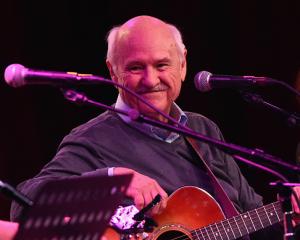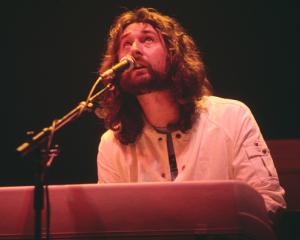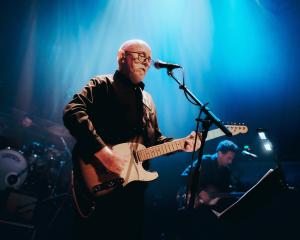David Bowie, the visionary British rock star who framed hits such as "Space Oddity" with flamboyant pop personas like "Ziggy Stardust" and androgynous displays of sexuality, has died aged 69 after a secret battle with cancer.
A pioneering chameleon of performance imagery, Bowie straddled the worlds of hedonistic rock, fashion, art and drama for five decades, pushing the boundaries of music and his own sanity to produce some of the most innovative songs of his generation.
"David Bowie died peacefully today surrounded by his family after a courageous 18-month battle with cancer," read a statement on Bowie's Facebook page dated January 10. Bowie's son, Duncan Jones, confirmed the death.
Very sorry and sad to say it's true. I'll be offline for a while. Love to all. pic.twitter.com/Kh2fq3tf9m
— Duncan Jones (@ManMadeMoon) January 11, 2016
A spokesman for Bowie said he died on Sunday but declined to say where he died or from what type of cancer.
Mourners laid flowers and lit candles beside a memorial to Bowie in the edgy Brixton district of south London where he was born. Tributes poured in from titans of popular music, including the Rolling Stones, Madonna and rapper Kanye West.
"The Rolling Stones are shocked and deeply saddened to hear of the death of our dear friend David Bowie," the Stones said. "He was an extraordinary artist, and a true original."
Madonna said on Twitter: "Talented. Unique. Genius. Game Changer. The Man who Fell to Earth. Your Spirit Lives on Forever!"
British Prime Minister David Cameron said he had grown up with Bowie's music and described his death as "a huge loss". The Vatican said: "Check ignition and may God's love be with you" - borrowing a verse from Bowie's first hit "Space Oddity".
In a music video accompanying Bowie's new, jazzy "Blackstar" album, released on his 69th birthday last Friday, the singer was shown in a hospital bed with bandages around his eyes.
Born David Jones in south London two years after the end of World War 2, he took up the saxophone at 13 before changing his name to David Bowie to avoid confusion with the Monkees' Davy Jones, according to Rolling Stone.
He shot to fame in Britain in 1969 with "Space Oddity", whose words he said were inspired by watching Stanley Kubrick's film "2001: A Space Odyssey" while stoned.
Bowie's haunting lyrics summed up the loneliness of the Cold War space race between the United States and the Soviet Union and coincided with the Apollo spacecraft landing on the moon.
"Ground Control to Major Tom. Take your protein pills and put your helmet on ... For here am I sitting in my tin can. Far above the world. Planet Earth is blue. And there's nothing I can do."
Ziggy Stardust
But it was Bowie's 1972 portrayal of a doomed bisexual rock envoy from space, Ziggy Stardust, that propelled him to global stardom. Bowie and Ziggy, wearing outrageous costumes, makeup and bright orange hair, took the pop world by storm.
He defined the theatrical glam rock movement with the albums "Hunky Dory", "The Rise and Fall of Ziggy Stardust and the Spiders from Mars", and "Aladdin Sane".
"Ziggy played guitar, jamming good with Weird and Gilly," Bowie sang with a red lightning bolt across his face and flamboyant jumpsuits. "Making love with his ego, Ziggy sucked up into his mind, like a leper messiah."
By now an influential icon of artistic reinvention venturing into the theatre, film and fashion worlds, Bowie continued to innovate, helping produce Lou Reed's "Walk on the Wild Side" and Iggy Pop's "Lust for Life" album, delving into American rhythm & blues and co-writing the hit "Fame" with John Lennon.
This was a period which saw Bowie sporting an array of fantastic costumes, some reportedly based on the chilling Kubrick movie "A Clockwork Orange".
"The trousers may change, but the actual words and subjects I've always chosen to write with are things to do with isolation, abandonment, fear and anxiety, all of the high points of one's life," Bowie said in a rare interview in 2002.
"He always did what he wanted to do. And he wanted to do it his way and he wanted to do it the best way," said Tony Visconti, the U.S. producer who helped lift Bowie to stardom.
"He was an extraordinary man, full of love and life. He will always be with us. For now, it is appropriate to cry," he said.
Ever ahead of public opinion, Bowie told the Melody Maker newspaper in 1972 that he was gay, a step that helped pioneer sexual openness in Britain, which had only decriminalised homosexuality in 1967. Bowie had married in 1970.
Four years later, he informed Playboy that he was bisexual, but in the 1980s he told Rolling Stone magazine that the declaration was "the biggest mistake I ever made" and that he was "always a closet heterosexual".
Let's Dance
Bowie went through another metamorphosis in the mid-seventies, adopting a soul and funk sound, and abandoning stack heels for designer suits and flat shoes.
He scored his first U.S. number one with "Fame" and created a new persona, the "Thin White Duke", for his "Station to Station" album.
But the excesses of a hedonistic life were taking their toll. In a reference to his prodigious appetite for cocaine, he said: ""I blew my nose one day in California. "And half my brains came out. Something had to be done."
Bowie moved from the United States to Switzerland and then to Cold War-era Berlin to recuperate, working with Brian Eno from Roxy Music to produce some of his least commercial and most ambitious music, including ""Low" and ""Heroes" in 1977.
He scored a big hit with funk dance track "Fashion" in 1980.
In 1983 Bowie changed tack again, signing a multi-million-dollar five-album deal with EMI. The first, ""Let's Dance", returned him to chart success and almost paid off his advance.
"If you say run, I'll run with you. If you say hide, we'll hide. Because my love for you. Would break my heart in two," he sang in Let's Dance.
He starred on Broadway in "The Elephant Man" at the start of the decade and appeared in an array of films including "Merry Christmas, Mr Lawrence", "The Snowman", "Absolute Beginners" and as Pontius Pilate in Martin Scorsese's "The Last Temptation of Christ".
His love-life fascinated gossip columnists and his marriage to Somali-American supermodel Iman in 1992 guaranteed headlines.
Bowie kept a low profile after undergoing emergency heart surgery in 2004. It was not widely known that he was fighting cancer.
"Look up here, I'm in heaven," he sings from a hospital bed in the video accompanying his last album.
"I've got scars that can't be seen. I've got drama, can't be stolen. Everybody knows me now. Look up here, man, I'm in danger. I've got nothing left to lose."
Tours to NZ
Bowie toured New Zealand four times in his career. He first played in 1978, when he brought his Low/Heroes Tour to Australia and New Zealand. He rocked out Christchurch's Queen Elizabeth Park - the one and only time he played in the South Island - and Auckland's Western Springs.
The Auckland gig on December 2 that year broke a national attendance record - with the 41,000-strong crowd reportedly the largest in the history of New Zealand concerts. The crowd was so big, the singer stopped during the second part of the show to photograph the audience.
Bowie also spent time in New Zealand during the filming of the movie Merry Christmas Mr Lawrence in which he played the lead role of a British soldier in a Japanese prisoner of war camp, which was partly shot in Auckland.
In 1983, Bowie brought his Serious Moonlight Tour to New Zealand coinciding with his most popular album, Let's Dance, and his biggest concert audiences.
The staging was reportedly some of his most elaborate since 1974, and included four enormous translucent polythene columns, high neoclassical lintels and a giant hand sitting on stage right and a glittering crescent moon on stage left.
He landed in Wellington on November 22 with an entourage of 96. He stopped briefly to speak to a TV crew, saying: "I can't believe we've got through such a long period. I could quite happily go on for longer. The people on the tour have been so good, so much fun; there's no narcotics on this tour. Also, I am determined to get out more this time and have hired a car to go driving, not the chauffeur car, just by myself."
He made newspaper headlines here for his back-stage demands, which included a bowl of raw fish before each performance. However, his promoter at the time, Hugh Lynn, said his demands were not excessive compared with other rock stars who had performed in New Zealand.
A day later, Bowie became the first rock star in history to visit a marae, being welcomed onto Takapuwahia Marae in Porirua. He performed a short exclusive song written for the occasion walled Waiata.
Bowie played Athletic Park in Wellington, and returned to Western Springs in Auckland. Fans travelled on special flights into the capital, which had been scheduled for the influx of people, and a train brought fans from Christchurch and Dunedin.
At Western Springs, Bowie again made history, with the 74,480-strong crowd the largest ever recorded at an Australasian concert. It was believed to be the largest single crowd gathering in New Zealand's history, and won a place in The Guinness Book of Records as the largest crowd gathering per head of population anywhere in the world.
At the end of the gig, Bowie spoke out against the nuclear arms race, saying: "I wish our world leaders would stop their insane inability to recognise that we wish to live peacefully", and released two white doves into the sky before singing his encore.
- Reuters, BBC, NZ Herald and NZME
















